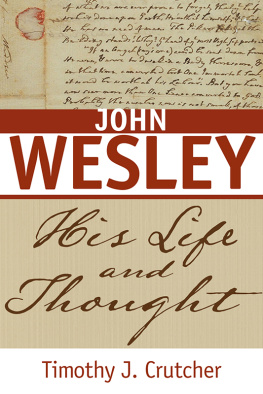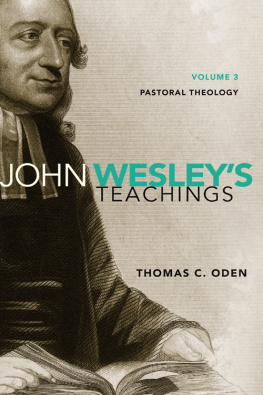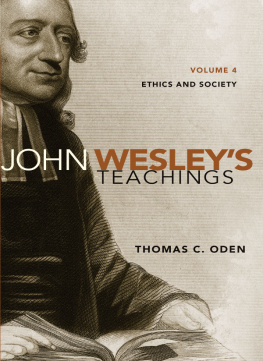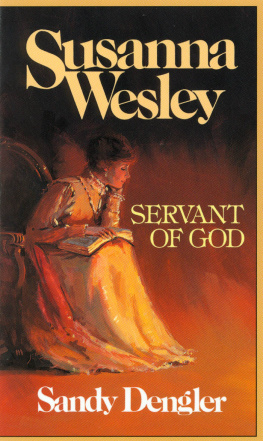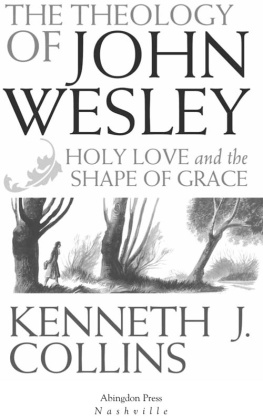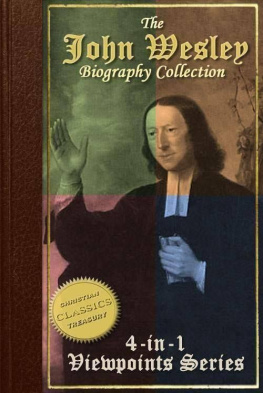Copyright 2015 by Timothy J. Crutcher and Beacon Hill Press of Kansas City
Beacon Hill Press of Kansas City
PO Box 419527
Kansas City, MO 64141
www.BeaconHillBooks.com
2014 eISBN 978-0-8341-3504-8
Printed in the
United States of America
All rights reserved. No part of this publication may be reproduced or transmittedin any form or by any meanselectronic, mechanical, or any otherexcept for briefquotations in printed reviews, without the prior written permission of the publisher.If you have received this publication from any source other than an online bookstore,youve received a pirated copy. Please contact us at the Nazarene Publishing Houseand notify us of the situation.
Cover Design: John Yuelkenbeck, Alias Creative Group
Interior Design: Sharon Page
Cover Image: Bridwell Library Special Collections, Perkins School of Theology,
Southern Methodist University
Library of Congress Cataloging-in-Publication Data
Crutcher, Timothy J.
John Wesley : his life and thought / Timothy J. Crutcher.
pages cm
Includes bibliographical references.
ISBN 978-0-8341-3494-2 (pbk.)
1. Wesley, John, 1703-1791. 2. Methodist ChurchEnglandClergyBiography. I. Title.
BX8495.W5C795 2015
287.092dc23
[B]
2014035221
Scripture quotations marked KJV are from the King James Version.
Scripture quotations marked NKJV are from the New King James Version (NKJV). Copyright 1979, 1980, 1982 Thomas Nelson, Inc. Used by permission.
The Internet addresses, email addresses, and phone numbers in this book are accurateat the time of publication. They are provided as a resource. Beacon Hill Press ofKansas City does not endorse them or vouch for their content or permanence.
To my students and colleagues at Southern Nazarene University
Contents


John Wesley is a significant theological figure for many people in the Protestantchurch, particularly for those who own the legacy of his Methodist movement and whoattend one of the various denominations that have arisen from it. This book is anattempt to give the reader a basic orientation to both John Wesleys biography andto the most significant parts of his theological legacy. It is intended as an easyintroduction to this rather complex figure, and so it is a book primarily designedfor beginning students of Wesley in courses of ministerial preparation or for interestedlaypeople who would like to know more about this great thinker and evangelist. Itis, therefore, a book more oriented toward the church than the formal academy. Hopefully,however, it is a book that can serve as a bridge between the two by giving readersenough thinking handles on Wesley that they can profitably engage deeper and morescholarly works about the man.
In part I of this book, we will introduce Wesleys biography, beginning with an overviewof his historical setting and then looking at his childhood, his early adulthood,the events that began his ministry, the earliest decade of the Evangelical Revivalof which he was a part and finishing with two chapters on the later sections of hislife. In this brief biographical glimpse, we will try to balance both the personaldetails of Wesleys own life and the way his life and ministry fit into the largercontroversies and issues with which he engaged.
In part II of the book, we will explore the basic intuitions that consistently emergethroughout his sermons and other writings. Wesley was what we might call an occasionaltheologian, meaning that he performed his theological vocation as the occasion demandedita little bit here, a little bit there; here a sermon, there a small tract. Henever organized all of that into a systematized theology himself, and so all patternswe might use to organize his thought are somewhat artificial. However, organize wemust, so our presentation of Wesley will begin with his theological method and thenexplore his basic views of God, creation, human beings, and sin. With this background,we will turn to Wesleys portrayal of the great drama of salvationboth in generaland in a specific order of salvationand how that salvation works its way out inthe corporate life of the church.
Because this book is intended as a simple introduction, we should note at the outsetthat Wesleys life and thought are, in fact, more complicated than they are herepresented. In trying to capture the major events of his life and the major intuitionsthat drive his thought, many layers of nuance had to be ignored. This is, of course,where we must start when we begin our journey of learning in any area, but it helpsto be reminded of that up front, lest the reader think that anything said or claimedin this book should be taken as the last word on the subject. The goal of this bookis to make the big picture as clear as possible, and so we have ignored some of thecomplexities that would easily cloud that picture. So, while we believe that Wesleystheological vision is coherent, we can admit that Wesleys implementation of thatvision in his various writings and activities was not always so coherent. However,those inconsistencies are easier to see against the backdrop of a larger vision ofhis work. And while they ought to concern historians and systematic theologians ofour own day, they can be conveniently ignored by those just starting out on theirencounter with Wesley.
Since this introduction is intended as a primary encounter with Wesley, we have focusedmuch more on his own writingsparticularly his Journal and his sermonsthan on whatother people have said about him. References outside of Wesley have been kept toa minimum, and all citations are from Wesley unless explicitly stated otherwise.In citing Wesley, we have tried to give enough information for the reader to findthe quote in any edition of his work, but we have also included, where available,volume and page citations in parentheses (for example, (8:13)) for the BicentennialEdition of Wesleys works (The Works of John Wesley [Oxford University Press andAbingdon Press, 19802013]). When complete, this will be the standard edition ofWesleys works in English. For those works that are yet unavailable in that edition,we have cited the previous standard editions of Wesleys works. We will cite TheWorks of John Wesley (3rd edition, edited by Thomas Jackson [Kansas City: BeaconHill Press of Kansas City, 1978]) as Jackson, with the volume and page number.For his later letters, we will use The Letters of the Rev. John Wesley, A.M. (editedby John Telford [London: Epworth, 1931]) and cite that as Telford, also with volumeand page number. In any quote from Wesley, the reader may assume that all emphasesand italics come from Wesleys published originals.
Finally, we should mention a feature of our use of language that some English readersmight find odd, namely the attempt to avoid gender-biased languageparticularlywhen referring to God. This means we will not use any pronouns for God, always referringto God as God and not with designations such as he or him. It may sound unnatural,but then using human language to talk about God is already unnatural in some way.Perhaps the awkwardness of talking about what God does for Gods self or the wayGod feels about Gods creation will remind us that God does not fit nicely and neatlyin our premade human categories of thought or language. Wesley, of course, livedin a time before such concerns arose, and we have made no attempt to conform Wesleyswritings to our contemporary sensitivities. He will use masculine pronouns for God,and say man, mankind, and he when referring to generic persons. Perhaps weshould be bothered by such things, but we will just have to forgive him and his culturefor their blindness up front. This seems better than constantly calling attentionto it with designations such as [

